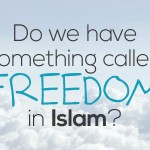Do We Have Something Called Freedom in Islam? (4)

Question on alleged contradiction between government authority and man’s divine vicegerency (khilafah)
The other question they have expressed is that, as stated in the Qur’an, man is the vicegerent of Allah [khalifat Allah]. It means that he is the viceroy of God on earth and acts like God. Just as God has created the universe, man also has to create phenomena. Just as God administers the world as He wills, man also has to do whatever he likes on earth
Reply to the above question
The reply to the above question is that the meaning of divine vicegerency [khilafat-e ilahi] should be properly understood and it must be noted that the title “khalifat Allah” mentioned in the Qur’an for Hadrat1 Adam (Adam) (‘a)2 is not applied to all the Children of Adam because the Qur’an calls some of them “devils” when it says:
﴿وَكَذَلِكَ جَعَلْنَا لِكُلِّ نِبِيٍّ عَدُوًّا شَيَاطِينَ الإِنسِ وَالْجِنِّ﴾
“That is how for every prophet We appointed as enemy the devils from among humans and jinn.”3
Undoubtedly, the human devil is neither a viceroy of God nor among those before whom the angels had to prostrate when God said:
﴿وَإِذْ قَالَ رَبُّكَ لِلْمَلاَئِكَةِ إِنِّي خَالِقٌ بَشَرًا مِن صَلْصَالٍ مِن حَمَاءٍ مَسْنُونٍ ٭ فَإِذَا سَوَّيْتُهُ وَنَفَخْتُ فِيهِ مِن رُوحِي فَقَعُوا لَهُ سَاجِدِينَ﴾
“When your Lord said to the angels, ‘Indeed I am going to create a human out of a dry clay [drawn] from an aging mud. So when I have proportioned him and breathed into him of My spirit, then fall down in prostration before him’.”4
The vicegerent of Allah possesses great distinction and qualities such as knowledge of the Names—“And He taught Adam the Names, all of them…”5 Also, the viceroy of God must be capable of implementing justice on earth. So, the wicked man who sheds blood in the world and does not refrain from committing any crime, or the one who does not possess any sense of justice cannot be the viceroy of God. Is God an oppressor that His vicegerent is also an oppressor?
The vicegerent of Allah is he who manifests divine qualities in his private and social life, and not just any two-footed being walking on the surface of the earth. Therefore, those who are striving to misguide people and overthrow the Islamic government are not only unqualified to be divine vicegerents but they are the same human devils who are regarded by God to be viler than animals, and about whom He says:
﴿إِنَّ شَرَّ الدَّوَابُ عِندَ اللّهِ الصُّمُّ الْبُكْمُ الَّذِينَ لاَ يَعْقِلُونَ﴾
“Indeed the worst of beasts in Allah’s sight are the deaf and the dumb who do not apply reason.”6
To say that human dignity lies in freedom and that anything which limits this freedom is condemnable and unacceptable is a deceptive slogan chanted by the Western world. Without paying attention to its corollaries, some people in other countries have also pursued it and are regularly insisting on it. Undoubtedly, to deal with this slogan and the objectives it tries to attain requires a lengthy discussion on which we shall embark in the future.
But for the meantime, let us briefly pose this question: What does it mean by saying that man should be absolutely free and have no restrictions at all? Does it mean that there should be no mandatory law? This is something which no rational person will ever accept because it implies that everyone is free to do whatever he likes—everyone is free to commit murder, transgress upon the chastity of women, and create havoc in society! Certainly, the first harm and mischief of such an outlook will be tasted by its proponent. Could there possibly be a society where such freedom is prevalent? Obviously there is no concept of unrestrained freedom and man is not free to do whatever he likes.
Clarifying that freedom has limitations and restrictions, the question arises: Who should determine the extent and limit of freedom? And, what is the extent of freedom? If every person is supposed to determine the scope and extent of freedom, everyone would do whatever he likes which will manifest the same problems indicated in relation to absolute freedom. So, there is no option but to consider a legal reference in order to describe and determine the scope, limit and boundary of freedom.
In this case, if a person acknowledges the existence of God and believes that He knows better than him what is beneficial and harmful to man, and Who does not acquire any benefit from the lives of people and only wishes what is good for His servants, for him, is there anyone worthier than God in determining the limits of freedom? Thus, there is no contradiction in the intellectual and ideological system of the Muslims because they believe in God who knows best what is beneficial and harmful for human beings. It is He who has stated the limits and boundaries of freedom.
But if we do not believe in God, or believe in monotheism but do not recognize God as the authority determining the limits of freedom and believe that the people themselves should determine the limits of freedom, we will be afflicted with thousands of evils, because people will never arrive at a consensus. Even if the majority determines the limits of freedom, how will the minority that does not accept the limits of freedom determined by the majority exercise its rights? So, freedom is an elegant and pleasant term but it is not absolute and unrestricted. No one can claim absolute freedom.
Muhammad Taqi Misbah Yazdi Written by
Mansoor L. Limba Translated by
References:
- Hadrat: The Arabic word Hadrat is used as a respectful form of address. [Trans.]
- In this regard, God says:
﴿ وَإِذْ قَالَ رَبُّكَ لِلْمَلاَئِكَةِ إِنِّي جَاعِلٌ فِي الأَرْضِ خَلِيفَةً قَالُوا أَتَجْعَلُ فِيهَا مَن يُفْسِدُ فِيهَا وَ يَسْفِكُ الدِّمَاءَ وَنَحْنُ نُسَبِّحُ بِحَمْدِكَ وَنُقَدِّسُ لَكَ قَالَ إِنِّي أَعْلَمُ مَا لاَ تَعْلَمُونَ ﴾
“When your Lord said to the angels, ‘Indeed I am going to set a viceroy on the earth,’ they said, ‘Will you set in it someone who will cause corruption in it, and shed blood, while we celebrate Your praise and proclaim Your sanctity?’ He said, ‘Indeed I know what you do not know’.” (Surah al-Baqarah 2:30)
- Surah al-An‘am 6:112.
- Surah al-Hijr 15:29-30.
- Surah al-Baqarah 2:31.
- Surah al-Anfal 8:22.

